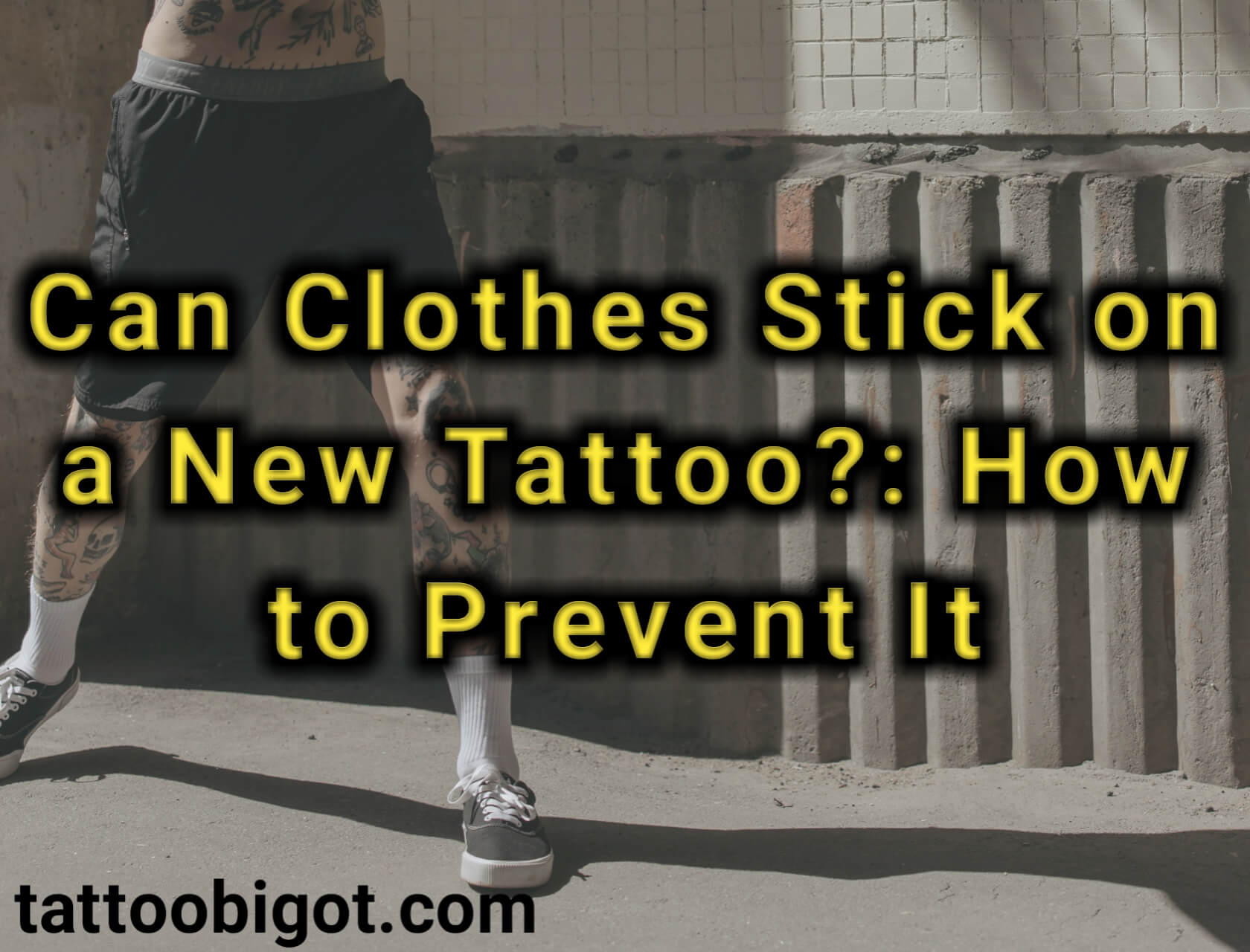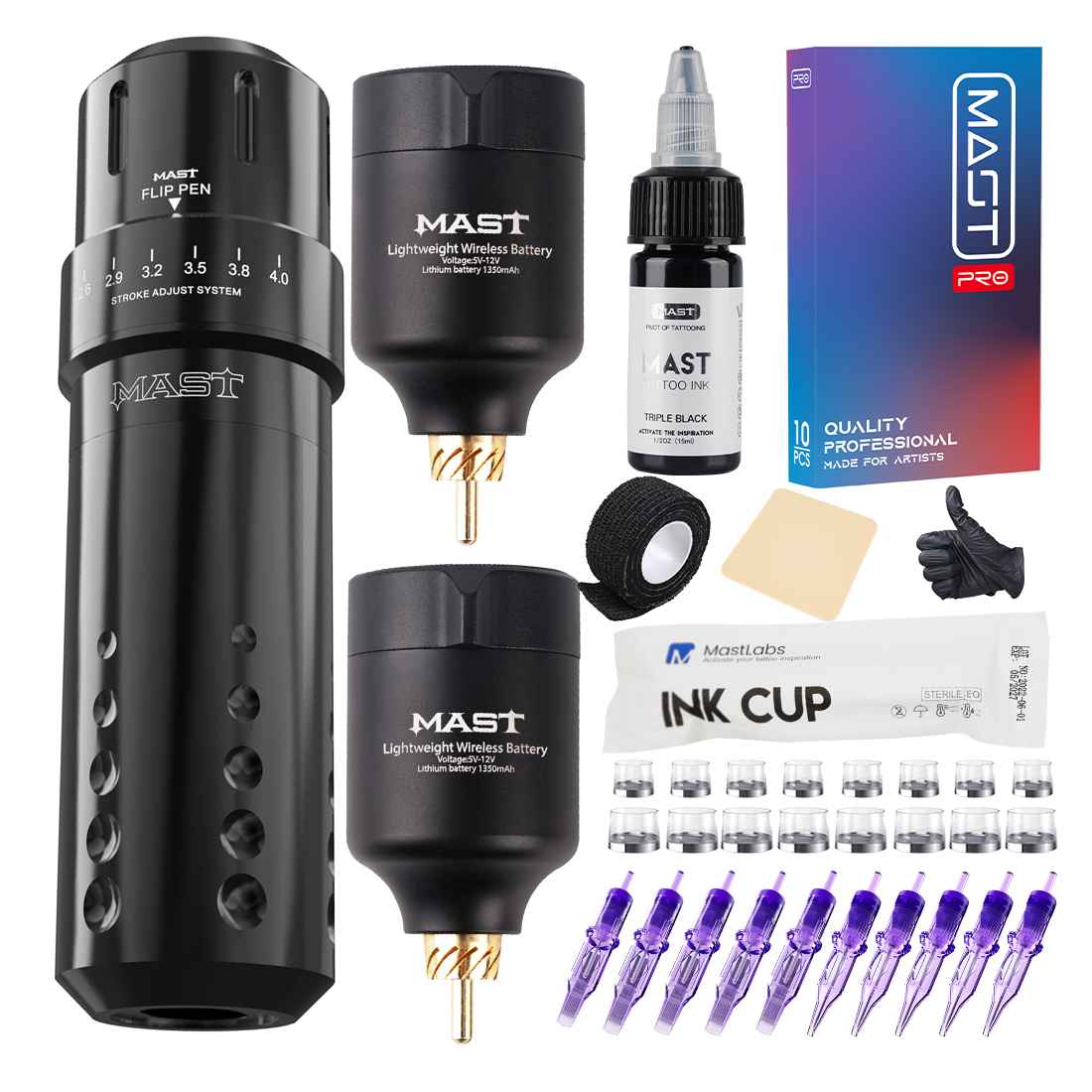Getting a new tattoo is an exciting experience, but it also comes with responsibilities during the healing process. One common concern for individuals with fresh tattoos is the possibility of clothes sticking to the inked area.
In this article, we will explore the “Can clothes stick on a new tattoo?”. We will look at the reasons behind clothes sticking to new tattoos, the potential risks involved, and most importantly, how to prevent it.
We will provide you with essential tips and guidelines to ensure a smooth healing process while keeping your clothing from interfering with your new tattoo.
Can Clothes Stick on a New Tattoo?
When you get a new tattoo, your skin undergoes a healing process that takes several weeks. Initially, your tattoo will be covered with a protective bandage or wrap to prevent contamination and promote healing.
After a few hours, you will need to remove the bandage and follow specific aftercare instructions provided by your tattoo artist.
The Risk of Clothes Sticking to a New Tattoo:
During the healing phase, your tattooed skin might develop a thin layer of plasma, blood, and lymph fluid. If these fluids dry and form a crust on your tattoo, clothes can easily stick to the area, causing discomfort and potentially damaging the tattoo.
Moreover, when clothes stick to the tattoo, they can disrupt the scabbing process and hinder the proper healing of the tattooed skin.
Importance of Proper Aftercare:
To prevent clothes from sticking to your new tattoo, it is crucial to follow the aftercare instructions provided by your tattoo artist.
Proper aftercare ensures optimal healing conditions for your tattoo and reduces the risk of complications.
By maintaining cleanliness, moisturizing the tattooed area, and protecting it from external factors, you can promote faster healing and minimize the chances of clothes sticking to your fresh tattoo.
How do you keep clothes from sticking to tattoos?
There are a few things you can do to keep your clothes from sticking to your tattoo. These include;
1. Use a Non-Stick Bandage or Wrap:
During the first few hours after getting your tattoo, your artist might cover it with a non-stick bandage or wrap. This protective barrier helps to prevent clothes from adhering to the tattooed area. It is essential to follow your artist’s instructions on when and how to remove the bandage.
2. Apply a Thin Layer of Petroleum Jelly or Ointment:
After removing the initial bandage, your tattoo artist will advise you to clean the tattoo and apply a thin layer of petroleum jelly or a specialized tattoo ointment. This protective layer acts as a lubricant, reducing friction between your skin and clothes, thus preventing them from sticking to the tattoo.
3. Choose Loose-Fitting Clothing:
During the healing process, opt for loose-fitting clothes that provide ample room for air circulation. Tight or constricting clothing can rub against the tattoo and cause clothes to stick, leading to potential damage and discomfort. Loose clothing also minimizes the risk of irritation and allows your tattoo to breathe.
4. Opt for Breathable Fabrics:
When selecting your clothing, prioritize breathable fabrics like cotton or natural fibers. These materials allow better airflow to the tattooed area and reduce the chances of clothes sticking to your fresh ink.
Avoid synthetic fabrics that can trap moisture and heat, as they may increase the risk of clothes adhering to the tattoo.
5. Avoid Rough or Textured Materials:
Rough or textured materials, such as wool or abrasive fabrics, can easily catch on scabs or delicate skin during the healing process. Choose smooth and soft fabrics that glide over the tattooed area, preventing clothes from sticking and interfering with the healing process.
6. Be Cautious During Physical Activities:
Engaging in physical activities that involve excessive movement or sweating can increase the chances of clothes sticking to your tattoo.
Be mindful of this when participating in exercises or any activities that may cause friction against your clothing. Consider modifying your attire or taking extra precautions, such as using a non-stick wrap or wearing looser clothing.
Can my pants touch my new tattoo?
Wearing pants over a new tattoo can be a cause for concern, as the fabric can rub against the delicate and healing skin. Pants with tight or restrictive waistbands may irritate the tattooed area and potentially lead to clothes sticking to the tattoo.
Balancing Protection and Healing:
While it is important to protect your fresh tattoo, it is equally crucial to allow it to breathe and heal properly. If wearing pants is necessary, choose options with loose waistbands or adjustable fits.
Avoid clothing that puts excessive pressure on the tattooed area, as this can hinder the healing process and increase the risk of clothes sticking to the tattoo.
Consideration for Different Types of Pants:
The type of pants you wear can also impact the contact between the fabric and your tattoo. Loose-fitting or baggy pants provide more room and minimize the chances of clothes sticking.
If possible, opt for breathable fabrics and avoid pants made of rough materials or those with embellishments that may catch on the tattoo.
Also Read: Wearing Clothes Over a New Tattoo: A Complete Guide to Aftercare
Can you sleep with clothing over a fresh tattoo?
It is generally recommended to avoid sleeping with clothing directly over a fresh tattoo, especially during the initial healing stages.
While it may not always be possible to completely avoid contact between your tattoo and clothing while sleeping, taking certain precautions can help minimize the risk of clothes sticking to the tattoo and disrupting the healing process.
Here are some tips to consider when sleeping with a fresh tattoo:
1. Choose Loose-Fitting Clothing: Opt for loose-fitting sleepwear made of soft, breathable fabrics. Loose clothing allows better airflow and reduces friction against the tattooed area, minimizing the chances of clothes sticking to the fresh ink.
2. Keep the Tattoo Uncovered, if Possible: If appropriate, try to keep the tattoo uncovered during sleep. Allowing the tattoo to breathe and remain exposed to air can aid in the healing process.
However, make sure your bedding is clean to prevent bacteria or irritants from coming into contact with the tattoo.
3. Use Clean Bedding: Ensure your bedding, including sheets and pillowcases, is clean and free of dirt, irritants, or potential contaminants.
Use freshly laundered bedding to reduce the risk of introducing any substances that may interfere with the healing process or cause irritation to the tattooed skin.
4. Avoid Rough or Textured Fabrics: Choose sleepwear and bedding made of smooth fabrics that are less likely to catch on the tattoo or cause clothes to stick. Rough or textured fabrics can increase friction and potentially disrupt the healing process.
5. Consider Protective Measures: If you’re concerned about clothes sticking to your fresh tattoo during sleep, you can take additional precautions.
Applying a thin layer of petroleum jelly or a specialized tattoo ointment before bed can create a protective barrier between the tattoo and clothing, reducing friction.
It’s important to note that every tattoo heals differently, and individual circumstances may vary.
Consulting with your tattoo artist and following their specific aftercare instructions is crucial.
They can provide personalized advice based on the size, location, and intricacy of your tattoo.
6. The Importance of Proper Bedding: When sleeping with a fresh tattoo, it is crucial to pay attention to your bedding. Opt for clean sheets and pillowcases to reduce the risk of introducing bacteria or irritants to your healing tattoo.
Additionally, ensure that your bedding is comfortable and does not cause friction against your tattooed skin.
7. Choosing Suitable Sleepwear:
To prevent clothes from sticking to your fresh tattoo during sleep, select sleepwear made of soft, breathable fabrics.
Loose-fitting pajamas or nightgowns can help reduce contact between your tattoo and the fabric, minimizing the risk of clothes adhering to the inked area.
8. Preventing Fabric Friction During Sleep:
To further prevent clothes from sticking to your tattoo while sleeping, consider applying a thin layer of petroleum jelly or a specialized tattoo ointment before bed.
This provides lubrication and reduces friction between your skin and the fabric. Additionally, try to sleep in a position that minimizes direct contact between the tattoo and the bedding.
How long till you can wear clothes over a tattoo?
The timeline for when you can wear clothes over a tattoo depends on the healing stages of your specific tattoo.
Generally, the initial healing phase lasts around 2-3 weeks, during which you should follow your tattoo artist’s aftercare instructions diligently.
After this period, your tattoo enters the next stage of healing.
Consultation with Your Tattoo Artist:
To determine when it is safe to wear clothes over your tattoo, consult your tattoo artist. They have the expertise to assess the progress of your healing tattoo and provide guidance on when you can resume wearing clothing without the risk of clothes sticking or causing damage.
Following the Recommended Timeline:
While every tattoo heals at its own pace, it is generally recommended to avoid tight or restrictive clothing over a new tattoo for the first few weeks.
As your tattoo heals and the skin regains its strength, you can gradually reintroduce clothing, ensuring they are loose-fitting and made of breathable fabrics.
Also Read: How to Keep Your Tattoo from Sticking to Clothes?
What can damage a new tattoo?
Here are some things that can damage a tattoo, especially a new one.
1. Exposure to Sunlight or UV Rays:
One of the most significant threats to a new tattoo is excessive exposure to sunlight or UV rays. Sunburn or prolonged sun exposure can cause fading, discoloration, and damage to the tattooed skin.
It is crucial to protect your tattoo from direct sunlight by wearing appropriate clothing or using a broad-spectrum sunscreen with a high SPF.
2. Submerging the Tattoo in Water for Extended Periods:
During the healing process, it is essential to avoid submerging your fresh tattoo in water for extended periods.
Prolonged exposure to water, such as swimming or soaking in a bath, can cause the tattoo to become waterlogged, leading to fading, infection, and clothes sticking to the dampened skin.
Follow your artist’s instructions on when it is safe to expose your tattoo to water.
3. Scratching or Picking at the Tattoo:
Resist the urge to scratch or pick at your healing tattoo, as it can disrupt the scabbing process and potentially lead to infection or scarring.
Scratching can also cause clothes to stick to the tattoo, leading to discomfort and potential damage. Keep your tattoo clean and moisturized to minimize itching.
4. Applying Harsh Chemicals or Irritants:
When caring for your tattoo, avoid using harsh chemicals, fragrances, or skincare products that may irritate the tattooed skin.
Certain ingredients can cause allergic reactions or interfere with the healing process. Stick to gentle, fragrance-free soaps, moisturizers, and tattoo-specific aftercare products recommended by your tattoo artist.
Also Read: Why is my tattoo sticking to my clothes?
What do you put on a tattoo the day after?
Proper aftercare is vital for the healing and preservation of your new tattoo. The day after getting a tattoo, you should continue to follow the aftercare instructions provided by your tattoo artist.
While specific recommendations may vary, here are some general guidelines on what to put on your tattoo the day after:
Clean Hands: Before touching your tattoo or applying any products, ensure that your hands are clean.
Wash them thoroughly with warm water and a gentle, fragrance-free soap to minimize the risk of introducing bacteria or irritants to the tattooed area.
Gentle Cleansing: Using a mild, fragrance-free soap or a specialized tattoo cleanser recommended by your tattoo artist, gently cleanse the tattooed area.
Avoid scrubbing or rubbing the tattoo vigorously, as this can irritate the skin and disrupt the healing process. Pat the tattoo dry with a clean, soft towel.
Thin Layer of Moisturizer: Once the tattoo is clean and dry, you can apply a thin layer of moisturizer. Opt for a fragrance-free, non-comedogenic moisturizer or a specialized tattoo aftercare product.
These moisturizers help keep the tattooed skin hydrated, reducing the risk of excessive dryness and itchiness.
Avoid Excessive Moisture: While it’s essential to keep the tattoo moisturized, it’s equally important to avoid excessive moisture.
Applying too much moisturizer can suffocate the tattoo and impede the healing process. Use a minimal amount, ensuring that the skin can still breathe.
Follow Artist’s Recommendations: Your tattoo artist may provide specific instructions on the type of moisturizer or ointment to use on the tattoo.
They may suggest a particular brand or formulation that they have found effective for their clients. It’s important to follow their recommendations for the best results.
Protect from Sunlight: Protecting your tattoo from direct sunlight is crucial, especially during the early healing stages.
Apply a broad-spectrum sunscreen with a high SPF to the tattooed area if you need to go outside. Sun exposure can lead to fading, discoloration, and damage to the tattooed skin.
Remember, each tattoo and individual healing process is unique. It’s essential to consult your tattoo artist for personalized aftercare instructions that are specific to your tattoo.
They can assess the size, location, and intricacy of your tattoo and provide guidance tailored to your needs.
By following proper aftercare practices and using the recommended products, you can promote optimal healing, minimize complications, and help your tattoo retain its vibrancy and clarity in the long run.
Also Read: Wearing Pants with a New Leg Tattoo: Finding Comfort and Care
Applying Aftercare to a Tattoo
Proper aftercare plays a vital role in the healing and preservation of your tattoo.
Following the instructions provided by your tattoo artist ensures optimal conditions for the tattoo to heal correctly, minimizing the risk of complications and clothes sticking to the inked area.
Recommended Aftercare Practices
In addition to preventing clothes from sticking to your tattoo, there are other essential aftercare practices to follow.
These include gently washing the tattooed area with mild soap and water, patting it dry with a clean towel, and applying a thin layer of petroleum jelly or a specialized tattoo ointment.
It is important to avoid excessive moisture, harsh scrubbing, or picking at scabs.
Using Specialized Tattoo Ointments or Creams
Your tattoo artist may recommend specific tattoo ointments or creams for aftercare.
These products are designed to nourish and protect the tattooed skin, promoting optimal healing conditions.
Follow your artist’s instructions on how frequently to apply these products and ensure you are using them in moderation.
Also Read: What to Do If Your Tattoo Sticks to Your Clothes?
Conclusion
Let’s wrap it up in the question, “Can clothes stick on a new tattoo?”
Getting a new tattoo is a personal and artistic expression, and taking care of it during the healing process is crucial.
To prevent clothes from sticking to your fresh tattoo, follow the provided aftercare instructions, use non-stick bandages, apply a thin layer of petroleum jelly, choose loose-fitting and breathable clothing, and be cautious during physical activities.
Additionally, consider the impact of pants on your tattoo and take measures to protect it while sleeping. Always consult your tattoo artist for specific guidance on when it is safe to wear clothes over your tattoo.
FAQs
Can I wear tight clothes over a fresh tattoo?
Wearing tight clothes over a fresh tattoo is generally not recommended as they can rub against the tattooed area and potentially cause clothes to stick, leading to discomfort and possible damage. Opt for loose-fitting clothing that allows airflow and minimizes friction.
How long should I keep my tattoo covered?
The duration for keeping your tattoo covered varies depending on your artist’s instructions and the specific healing process of your tattoo.
Generally, you will be advised to keep the initial bandage on for a few hours and then follow aftercare guidelines, which may include keeping the tattoo uncovered during the day and applying a thin layer of ointment.
Is it normal for clothes to stick to a new tattoo?
In the early stages of the healing process, it is possible for clothes to stick to a new tattoo, especially if the tattooed area develops a thin layer of plasma, blood, or lymph fluid that dries and forms a crust. Proper aftercare and preventative measures can help minimize clothes sticking to the tattoo.
Can I wear jeans over a fresh tattoo?
Wearing jeans over a fresh tattoo is generally not recommended during the initial healing phase.
Jeans can be constricting and have rough textures that can irritate the tattooed area and potentially cause clothes to stick. Opt for loose-fitting pants made of breathable fabrics instead.
Can I swim with a new tattoo?
It is generally advised to avoid swimming or submerging your new tattoo in water during the initial healing phase.
Prolonged exposure to water can lead to clothes sticking to the tattoo, as well as increase the risk of infection.
Consult your tattoo artist for specific instructions on when it is safe to swim with your healed tattoo.






